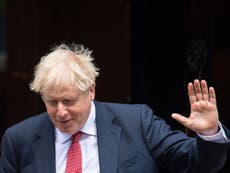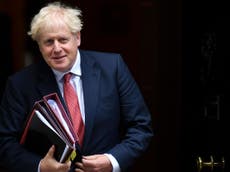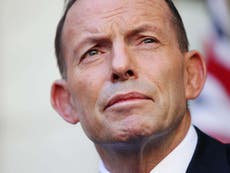Never mind a ‘divorce’ from the EU – Brexit will turn into a cold war
The legacy of all this will result in the worst ever peacetime relations between Britain and the whole continent of Europe

Not for the first time, Brexit goes through the looking glass. It takes a painful, but necessary effort of memory to understand what is actually going on in this topsy-turvy world. Reliving past anguish isn’t pleasant, but it has to be done.
Back in the halcyon days when Theresa May was prime minister, the question of the Irish border had been resolved, or as resolved as it could be. It was worked out through the famous Irish backstop – a provision which meant there would be no borders on the island, because the whole of the UK would stay in aspects of the EU single market and the EU customs union in the event that a better new trade and the economic relationship couldn’t be designed.
That was Ms May’s deal – no need for a border between Ireland and Northern Ireland, whatever happened. It was there as an insurance policy, just in case the grand future UK-EU trade agreement failed (perish the thought).
That whole construct, however, was anathema to the Brexiteers as “BRINO” – Brexit In Name Only. It was rejected by some of May’s senior colleagues who resigned, including then foreign secretary Boris Johnson, and, by huge majorities, by the House of Commons, so she lost her job and there followed was what Johnson called a “backstopectomy”.
Of course, the Irish border issue remained, so then we ended up with the backstop to the backstop, which is the trade border down the Irish Sea, as now agreed, passed by parliament, and detailed in the UK-EU withdrawal agreement. This internal Great Britain-Northern Ireland border was, by the way, something Johnson said no British prime minister could accept, before he signed up to it, and was originally proposed as an option by the EU. The Democratic Unionists regarded it as betrayal, understandably enough. In any case, it was the basis of the “oven-ready” deal endorsed at the last general election.
Again, if all went well with the UK-EU talks it wouldn’t be a big deal anyway; if the talks failed (perish the thought...), then at least there’d be no checks on the Irish border.
Thus, the GB-NI economic border was how both the Good Friday Agreement and the integrity of the EU single market would be protected.
Now, though, there is to be a new backstop, the backstop to the backstop to the backstop. We might call it the UK backstop – no GB-NI border checks after all. It is to be overridden by new laws protecting the UK internal market, so-called, and the Irish Protocol provisions of the UK-EU withdrawal agreement are to be scrapped. This is because the UK now wants its own backstop to preserve the integrity of its own friction-free internal market across the Irish Sea.
Although not yet clear, it is assumed that the British still have no wish to see border controls on the border between Northern Ireland and Ireland instead. The logical problem of how the UK and the EU can both protect the integrity of their respective internal/single market without any economic borders anywhere between Ireland and the UK is solved by just ignoring it. It won’t work, and I suspect it will end up with the EU asking Ireland to try to somehow protect the single market from erosion and control the border, something that eluded a substantial chunk of the British army during the Troubles.
First, it means the UK unilaterally abrogating an international treaty entered into less than a year ago. It is a sophisticated legal form of that favourite British hobby of cherry-picking. Most of the UK-EU withdrawal agreement is perfectly acceptable to Britain, but Johnson very obviously always found the border down the Irish Sea irksome and pretended that it didn’t exist, constantly assuring questioners that they could tear up any pesky paperwork and send it to Downing Street.
The idea now is that the rest of the withdrawal agreement can stand, just not the bits about Northern Ireland that the British don’t like, with its obligations on state aid and the level playing field. The Northern Ireland Protocol was always a bit of a Trojan horse, preempting the wider trade talks, but the British solemnly signed up to it nonetheless (even if some MPs never read it).
This repudiation of the withdrawal agreement is legally dodgy. The withdrawal agreement has its own arbitration procedures, albeit still even now being finalised, in the event that one side reneges on the deal, as the British openly admit through briefings they are now “consciously” doing. According to the EU, “if compliance is still not restored, the agreement allows parties to suspend proportionally the application of the withdrawal agreement itself, except for citizens’ rights, or parts of other agreements between the Union and the United Kingdom.”
In reality of course, what’s happening now is not some modest technical infraction of the rules, as the cabinet st minister George Eustice tried to argue on the radio, but a practical renunciation of a crucial part of the deal – the Northern Irish Protocol.
The treaty in its entirety will unravel, probably including the safeguards for citizens rights, because of the bitterness it will engender. The withdrawal agreement was only ever envisaged as the preamble to the new UK-EU trade and security pact, but given that is no longer even desired by the British, except on their own rigid terms, there isn’t much point to the withdrawal agreement anyway. In the end, a disputed treaty will not stand. Under the terms of the 1970 Vienna Convention on international treaties , no country can forever be bound by any treaty, an idea that mirrors the British doctrine that no parliament can bind a future one. So the citizens’ rights provisions could fall.
It follows from that that the other provisions of the withdrawal agreement come back into play – including the £39bn “divorce settlement”. I am immediately reminded of the words Johnson uttered outside No 10 when he became premier, on 24 July last year: “And don’t forget that in the event of a no-deal outcome, we will have the extra lubrication of the £39bn...” You may recall Johnson too earlier telling the Commons that the EU could “go whistle” for such vast sums. No matter that HM Treasury have agreed that they are legal long-term financial obligations: Johnson wants to default on them, or use them as “leverage”, reversing the original order of the negotiations.
The legacy of all this will be the worst peacetime relations between the British and the whole continent of Europe since, well, maybe ever. The traditional British approach was to have some allies as well as some enemies on the continent and to preserve a balance of power. Soon it will have 27 states institutionally and collectively set against it. Thus, needless to add, it is far less benign than the “splendid isolation” of the 19th century when Britain was a global power and could afford to stand aloof.
Brexit will be less like a velvet divorce and more like a cold war, the most acrimonious long-running legally entangled dispute possible, poisoning relations for decades. It will have unknowable results, but be greatly to the detriment of both sides. Not least, it is difficult to see how Britain will “prosper mightily” when it faces being severed from its major markets and supply chains. Don’t forget that even if by some miracle a Canada-style free trade agreement was salvaged, it wouldn’t cover services, the sectors where the British possess the strongest competitive advantage.
There are plenty of other hideous consequences in this latest Brexit move towards a cold war with our former allies. It will weaken Nato and the fight against terror. It will make the channel migration crisis harder to deal with. It will make Scotland more determined to get out of the UK. It could mean a return to violence in Ireland, and a remilitarised border. It will also, unhelpfully, raise the status of Gibraltar and revive the dispute with Spain. Citizens on both sides will have no internationally-backed guarantees about their status. Now we know what Brexit means: we must ask ourselves candidly if this was the Brexit we voted for in 2016.





Join our commenting forum
Join thought-provoking conversations, follow other Independent readers and see their replies
Comments